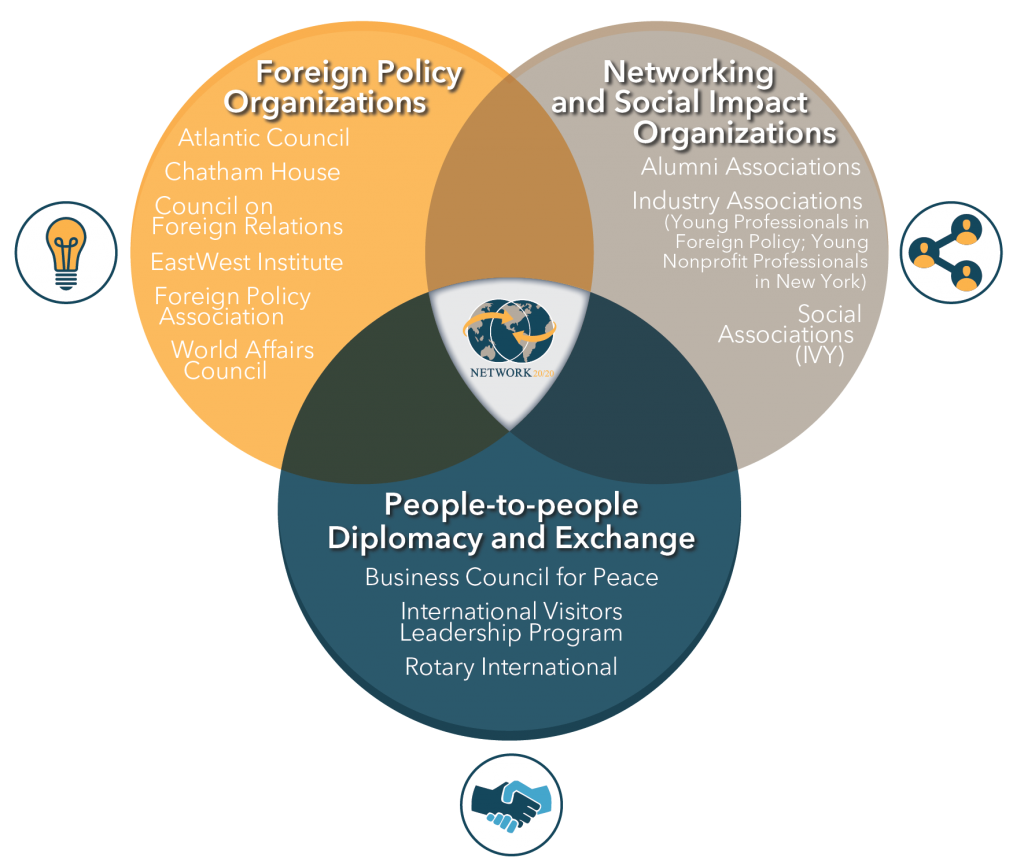Mission
Network 20/20 is an inclusive international community that bridges the gap between the private sector and foreign policy worlds. We leverage entrepreneurial, established, and emerging leaders to drive innovative research and solutions to critical foreign policy challenges.
“At a time of great global challenges, Network 20/20 provides invaluable service to America and the world by bringing together rising leaders from diverse backgrounds to share ideas, forge bonds, and influence policymaking. Network 20/20 promotes the kind of deep understanding, broad collaboration, and engagement that we need in today’s complex world.”
Vali Nasr, former Dean of the Johns Hopkins School of Advanced International Studies
What We Do
Network 20/20 bridges the gap between the private sector and the foreign policy worlds, engaging rising and established professionals meaningfully in foreign policy. We promote the open exchange of ideas on foreign affairs and essential people-to-people connections across international borders. We foster a community of diverse, smart, and engaged people, people who come from different countries, faiths, generations, and political views, all of whom are interested in better understanding the various trends and divergent interests that are shaping geo-economics, politics, and culture. We strive to promote the idea of global citizenship—that being an informed citizen of one’s country means understanding the global context and actively contributing one’s ideas and experiences to the conversation.
Why We Exist
When Network 20/20 started 15 years ago Gmail was still invite-only. Facebook and its current woes hadn’t yet launched. In 2003, we did not have 3 x 6.5 inch super-processor in our pockets ready to connect at a moment’s notice. In so many ways, the landscape in which we are now operating is dramatically different, one that is more connected to and knowledgeable about the world.
Yet. Consider this:
On the diplomatic front, in the last year, 12 percent of foreign affairs specialists have left the state department. Congressional testimony and the State Department spokesperson have confirmed that morale is abysmally low. As of early April 2018, over half of the 161 key, Senate-confirmed political appointments at the State Department remained unfilled. The proposed budget seeks a 26% cut in funding for the State Department. How would a decrease in over a quarter of your revenue affect your businesses? Our diplomacy is being hollowed out.
Or, consider this:
In the decade prior to 2014, American newspapers cut their international reporting staff by 24 percent. In the election year of 1988, network news covered stories with a foreign dateline for an average of 1600 minutes per year. In 2016, also an election year, that number plummeted to just 500.
We all are well aware of how social media platforms, state-sponsored “news”, and a 24-hour news cycle that is fixated on ratings have allowed not just fake news, but biased news to flourish—indeed, often opinion masquerades as news. We are all faced with the challenge of wading through more information to find a pearl of truth. Truly, the more we know, the less we seem to understand.
Lastly, consider this:
A 2017 Pew Survey showed that over the past year, perceptions of U.S. economic power have declined among many of America’s key trading partners and allies. At the same time, the share of U.S. investment going to developing countries has been falling, with the majority of investment going to a few Western European countries. Simultaneously, China’s $1 trillion One Belt, One Road initiative is building infrastructure and connecting economies from China through Central Asia, the Middle East and Southern and Eastern Europe, investment that is not lost on governments or the people.
We are not just becoming more isolated as a government, but as a people and as an economy, and to our detriment.
I reckon that most of you believe in more authentic connections across borders and sectors, because you also grapple with how to make sense of an information overload at a time when professional and personal demands overwhelm you, because you recognize that we, as citizens of whatever nation we come from, are all living on the same planet that is facing existential threats at a time when leadership seems in short supply.
In all of these areas—diplomacy, information, business—we see the value of Network 20/20. Our foreign policy briefings are designed to cut through the roar of information and to break down silos, allowing for the authentic interaction of foreign policy experts and attendees. Our Entrepreneurial Diplomacy program is breaking new ground by forming meaningful connections with business and governmental leaders abroad, most notably in Southeast Europe. Lastly, our network is strong and growing, its ranks populated by some of the most amazing, multifaceted people I have met.
In short, I reckon that you realize that now is not the time to hide. With huge technological changes affecting the way we work, live, and interact—now is the time to be present as the rules of business, information, and policy get remade, to be partners with counterparts abroad, to learn from and contribute to the ideals that comprise a global society. This is what Network 20/20 is about—an informed and personally connected global society, a platform for individuals to learn about foreign affairs and to be able to take action when needed.
As Stephen Colbert jokingly said, “if the founding fathers wanted us to care about the rest of the world, they wouldn’t have declared their independence from it.” Sadly, our society seems to be inching toward that vision. Network 20/20 is here to push back. So please, become a part of our growing and vibrant community!
– Adapted from Network 20/20’s President’s opening remarks at the April 2018 gala


